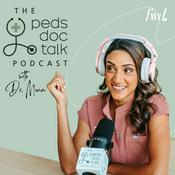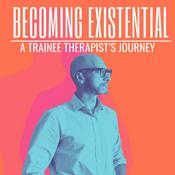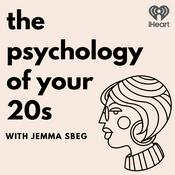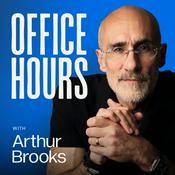The PedsDocTalk Podcast: Child Health, Development & Parenting—From a Pediatrician Mom
Dr. Mona Amin

Último episodio
378 episodios
- If mealtimes feel heavier than they should, this episode is going to make a lot click. I sit down with dietitians Diana and Dani to unpack how diet culture quietly slips into everyday parenting and shapes how kids see food, their bodies, and themselves. Their new book offers a roadmap for raising kids who trust their bodies and feel safe at the table, and our conversation goes far beyond picky eating. We talk about the language we use, the pressure we don’t realize we’re applying, and how small daily moments build a child’s long-term relationship with food.
What we discuss:
Why diet culture starts affecting kids as early as preschool
The “invisible curriculum” kids absorb from our modeling, messaging, and moments
What food positivity actually means and how it goes beyond food neutrality
How the Division of Responsibility supports trust and self-regulation
Common ways parents accidentally misapply feeding advice
Why labeling foods as good or bad backfires long term
The connection between pressure, restriction, and future dieting patterns
Reframing picky eaters as “learning eaters”
Why fewer than 5 percent of so-called picky eaters are truly nutrient deficient
How values like control vs connection influence feeding decisions
Small shifts parents can make to protect a child’s relationship with food
To connect with Diana Rice follow her on Instagram @anti.diet.kids and check out all her resources at https://tinyseednutrition.com/
Follow Dani Lebowitz at @kid.food.explorers and visit her website: https://kidfoodexplorers.com/
Their new book “Food Positivity: How to Ditch Diet Culture and Talk to Kids About Food“ is available for pre-order https://www.amazon.com/Food-Positivity-Ditch-Culture-About/dp/1394335202?&linkCode=sl1&tag=dianakrice-20&linkId=cb9fdb7069f2f96a3f795cbd75485914&language=en_US&ref_=as_li_ss_tl
Enjoy Diana Rice’s first episode, “Your kid doesn’t need a diet“ on the PedsDocTalk podcast. https://pedsdoctalk.com/podcast/your-kid-doesnt-need-a-diet-approaching-conversations-about-our-childs-weight-and-health-in-a-productive-way/
00:00 Welcome + What Is Food Positivity?
02:29 Meet Diana and Dani
04:24 How Diet Culture Starts in Early Childhood
06:09 The Invisible Curriculum: Modeling, Messaging, Moments
07:59 Food Positivity vs Food Neutrality
14:43 Division of Responsibility Made Simple
18:59 Why Red Light, Green Light Backfires
20:15 Felt Safety, Trust, and Confident Food Leadership
33:22 Rethinking “Picky Eating” as Learning Eating
38:10 Pressure, Restriction, and Self-Regulation
42:01 Small Shifts to Protect Your Child’s Relationship with Food
48:43 Where to Get the Book + Final Takeaways
Our podcasts are also now on YouTube. If you prefer a video podcast with closed captioning, check us out there and subscribe to PedsDocTalk.
Get trusted pediatric advice, relatable parenting insights, and evidence-based tips delivered straight to your inbox—join thousands of parents who rely on the PDT newsletter to stay informed, supported, and confident. Join the newsletter!
And don’t forget to follow @pedsdoctalkpodcast on Instagram—our new space just for parents looking for real talk and real support.
We love the sponsors that make this show possible! You can always find all the special deals and codes for all our current sponsors on the PedsDocTalk Podcast Sponsorships page of the website.
Learn more about your ad choices. Visit podcastchoices.com/adchoices - Sleep training is one of the most emotionally charged parenting topics online, and this conversation pulls it back to what actually matters, evidence. We talk about how social media amplifies fear and confusion, why parents are told to “trust” personalities instead of data, and how looking directly at research helps cut through the noise. While opinions are loud, the body of evidence around behavioral sleep interventions is far less controversial than the internet suggests.
We also walk through what the data says about timing, safety, and developmental readiness. From common myths about brain development to the fear of letting a baby cry, this episode centers on nuance. Sleep training is not all-or-nothing, not one rigid method, and not a replacement for parenting. It is a flexible set of tools families can adapt based on temperament, comfort, and goals.
What we discussed:
Why social media creates confusion around sleep training
The importance of trusting research over personalities
What the literature says about behavioral sleep interventions
Why there is less scientific debate than people think
Typical age ranges supported by evidence, around 4 to 6 months
Developmental readiness and self-soothing ability
The difference between sleep training and night weaning
Why babies vary widely in temperament and sleep patterns
The myth about prefrontal cortex development
Why infants are capable of learning sleep skills
Fear-based messaging and misuse of scientific language
How parental anxiety gets amplified by misinformation
Modifying sleep training methods to match family comfort
Graduated extinction, parental presence, and flexible approaches
The role of compromise between caregivers
The core goal, helping a child fall asleep without active intervention
Why sleep training does not replace responsive parenting
Want more? Listen to the full, original episode.
Our podcasts are also now on YouTube. If you prefer a video podcast with closed captioning, check us out there and subscribe to PedsDocTalk.
Get trusted pediatric advice, relatable parenting insights, and evidence-based tips delivered straight to your inbox—join thousands of parents who rely on the PDT newsletter to stay informed, supported, and confident. Join the newsletter!
And don’t forget to follow @pedsdoctalkpodcast on Instagram—our new space just for parents looking for real talk and real support.
We love the sponsors that make this show possible! You can always find all the special deals and codes for all our current sponsors on the PedsDocTalk Podcast Sponsorships page of the website.
Learn more about your ad choices. Visit podcastchoices.com/adchoices Dr. Paul Offit on the State of Vaccines in America and What Parents Need to Understand Now
11/2/2026 | 51 minThis episode is one of the most important conversations I’ve had about vaccines. I sit down with a leading vaccine expert to slow down the noise and talk honestly about where we are right now in America. We discuss how vaccines went from one of the greatest public health successes in history to something many families feel unsure about, and what that shift means for children. This is not about politics or headlines. It’s about what I see as a pediatrician, what clinicians across the country are experiencing, and why protecting kids still has to be the center of the conversation.
We talk about fear, misinformation, and the very real consequences of falling vaccination rates. I share personal stories from training and practice that still stay with me, and we unpack how trust eroded, how Covid changed the landscape, and what parents deserve to understand moving forward. My hope is that this episode helps families step back from the chaos and reconnect with the core goal we all share: keeping children safe, healthy, and out of hospitals whenever we can.
What we discuss:
The current state of vaccines in America
Why vaccines are a victim of their own success
How misinformation spreads faster than evidence
Turning points that eroded public trust in vaccines
The impact of Covid on vaccine perception
Real clinical consequences of falling vaccination rates
Stories of vaccine-preventable illness from practice
Why personal choice affects community safety
Changes to vaccine recommendations and public messaging
What parents should understand about risk vs benefit
To connect with Paul Offit follow him on Instagram @pauloffitmd and check out all his resources at https://www.paul-offit.com/
00:00 Opening Message: The Real Risk of Skipping Vaccines
02:12 Meet Dr. Paul Offit
03:30 The Current State of Vaccines in America
05:04 Vaccines Are a Victim of Their Own Success
06:12 Why We Still Need Vaccines for “Rare” Diseases
08:27 Where Modern Vaccine Distrust Began (1982 Turning Point)
10:34 Pandemic Fallout and Vaccine Hesitancy
12:02 Frontline Stories from COVID
15:06 Denial in the Face of Evidence
17:11 How Vaccine Communication Should Change
19:00 Operation Warp Speed and Scientific Breakthrough
21:13 Politics and Public Health History
23:18 Measles Deaths Are Not “The Cost of Doing Business”
25:20 Medical Freedom vs Public Responsibility
28:23 Schedule Changes and Shared Decision Making
32:49 Life Before Rotavirus Vaccine
34:02 RSV Breakthroughs and Modern Progress
38:31 The Emotional Toll of Vaccine Misinformation
40:02 Residency Stories: When Prevention Fails
43:30 A Message to Vaccine-Hesitant Parents
45:35 What Keeps Dr. Offit Fighting
47:04 Final Takeaway: Vaccines Succeeded So We Forgot
Our podcasts are also now on YouTube. If you prefer a video podcast with closed captioning, check us out there and subscribe to PedsDocTalk.
Get trusted pediatric advice, relatable parenting insights, and evidence-based tips delivered straight to your inbox—join thousands of parents who rely on the PDT newsletter to stay informed, supported, and confident. Join the newsletter!
And don’t forget to follow @pedsdoctalkpodcast on Instagram—our new space just for parents looking for real talk and real support.
We love the sponsors that make this show possible! You can always find all the special deals and codes for all our current sponsors on the PedsDocTalk Podcast Sponsorships page of the website.
Learn more about your ad choices. Visit podcastchoices.com/adchoices- Motherhood can quietly shift the emotional balance in a partnership. In this conversation, we explore why resentment toward a partner is so common after having a baby and why it is not a personal failure, but a researched, predictable relationship stress point. The transition to parenthood often exposes invisible labor, unequal expectations, and emotional strain that many couples were never taught how to name, let alone fix.
We also talk about practical starting points for repairing connection. From making invisible labor visible, to changing how conflict is communicated, this episode focuses on teamwork, fairness, and ongoing conversations that prevent resentment from hardening into distance. The goal is not perfection or 50-50 equality, but shared understanding and intentional partnership.
What we discussed:
Why resentment often grows after becoming parents
The emotional and physical load many mothers carry
Research showing relationship dissatisfaction in the first year postpartum
How partnership dynamics affect postpartum mental health
The concept of making invisible labor visible
Dividing responsibilities in a way that feels agreed upon, not forced
Why equality is not always 50-50, but fairness still matters
Separating the partner from the problem
Communicating needs without blame or accusation
How suppressed resentment turns into bitterness
The value of weekly relationship check-ins
Addressing partners who resist conversations about workload
Explaining impact instead of arguing details
How shared labor improves emotional and physical intimacy
Why connection is built through everyday support, not grand gestures
Want more? Listen to the full, original episode.
Our podcasts are also now on YouTube. If you prefer a video podcast with closed captioning, check us out there and subscribe to PedsDocTalk.
Get trusted pediatric advice, relatable parenting insights, and evidence-based tips delivered straight to your inbox—join thousands of parents who rely on the PDT newsletter to stay informed, supported, and confident. Join the newsletter!
And don’t forget to follow @pedsdoctalkpodcast on Instagram—our new space just for parents looking for real talk and real support.
We love the sponsors that make this show possible! You can always find all the special deals and codes for all our current sponsors on the PedsDocTalk Podcast Sponsorships page of the website.
Learn more about your ad choices. Visit podcastchoices.com/adchoices - In this solo episode, I reflect on how parenting has changed since the 90s, and not always for the better. This episode is not about going backward or rejecting progress. It is about blending what we know now about emotions and development with what used to work well, giving kids space, time, and trust to grow.
I explore how constant comparison, nonstop information, overscheduling, and screens have shifted parenting toward fear and control, often leaving parents exhausted and kids overwhelmed. I share why boredom matters, why independence is built in small moments, and how parenting feels lighter when it is guided by values instead of perfection.
In this episode, I talk about:
Why independence is a skill kids build through small, age-appropriate freedoms
Why bullying feels heavier now, and how protecting home as a safe space matters
How overscheduling crowds out confidence, creativity, and rest
Why boredom is not a problem, but a skill kids need to practice
A values-based approach to screens, using them intentionally instead of automatically
Why errands, car rides, and everyday moments are real opportunities for growth
Why doing less can help both kids and parents feel calmer and more confident
00:00 Parenting Like It’s 1996
01:39 The Park Moment and Independence
02:56 Fear, Comparison, and Information Overload
05:45 Overscheduling and the Loss of Boredom
07:16 Screens Then vs Screens Now
11:15 Why Boredom Builds Confidence
13:00 Kids Belong in the Real World
13:58 What Parenting Has Improved
16:09 The Permission to Do Less
17:12 Letting Go of Perfect Parenting
Our podcasts are also now on YouTube. If you prefer a video podcast with closed captioning, check us out there and subscribe to PedsDocTalk.
Get trusted pediatric advice, relatable parenting insights, and evidence-based tips delivered straight to your inbox—join thousands of parents who rely on the PDT newsletter to stay informed, supported, and confident. Join the newsletter!
And don’t forget to follow @pedsdoctalkpodcast on Instagram—our new space just for parents looking for real talk and real support.
We love the sponsors that make this show possible! You can always find all the special deals and codes for all our current sponsors on the PedsDocTalk Podcast Sponsorships page of the website.
Learn more about your ad choices. Visit podcastchoices.com/adchoices
Más podcasts de Salud y forma física
Podcasts a la moda de Salud y forma física
Acerca de The PedsDocTalk Podcast: Child Health, Development & Parenting—From a Pediatrician Mom
The PedsDocTalk Podcast is your go-to parenting resource, hosted by Dr. Mona Amin, a trusted pediatrician, parenting expert, and mom of two. As a top 30 Parenting Podcast in the U.S., this show delivers expert-backed guidance on child development, health, illness, behavior, feeding, and sleep—giving parents the confidence to navigate every stage from baby to teen.
Each episode dives into real-life parenting challenges, featuring conversations with specialists in pediatrics, child psychology, nutrition, and parental well-being. From potty training and sleep training to tackling tantrums, picky eating, discipline, screen time, postpartum recovery, and developmental milestones, Dr. Mona provides practical, science-backed advice that actually works.
Tune in on Mondays and Wednesdays for actionable insights, mindset shifts, and expert interviews that empower you to raise healthy, resilient, and happy kids—while thriving as a parent yourself!
Sitio web del podcastEscucha The PedsDocTalk Podcast: Child Health, Development & Parenting—From a Pediatrician Mom, Durmiendo y muchos más podcasts de todo el mundo con la aplicación de radio.net

Descarga la app gratuita: radio.net
- Añadir radios y podcasts a favoritos
- Transmisión por Wi-Fi y Bluetooth
- Carplay & Android Auto compatible
- Muchas otras funciones de la app
Descarga la app gratuita: radio.net
- Añadir radios y podcasts a favoritos
- Transmisión por Wi-Fi y Bluetooth
- Carplay & Android Auto compatible
- Muchas otras funciones de la app


The PedsDocTalk Podcast: Child Health, Development & Parenting—From a Pediatrician Mom
Escanea el código,
Descarga la app,
Escucha.
Descarga la app,
Escucha.

































